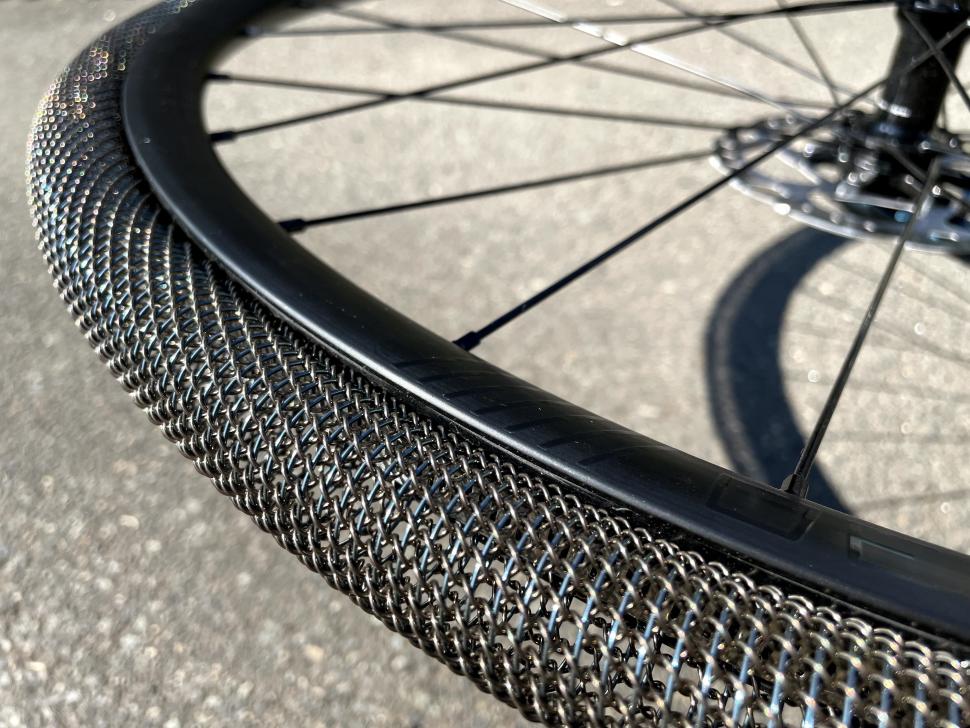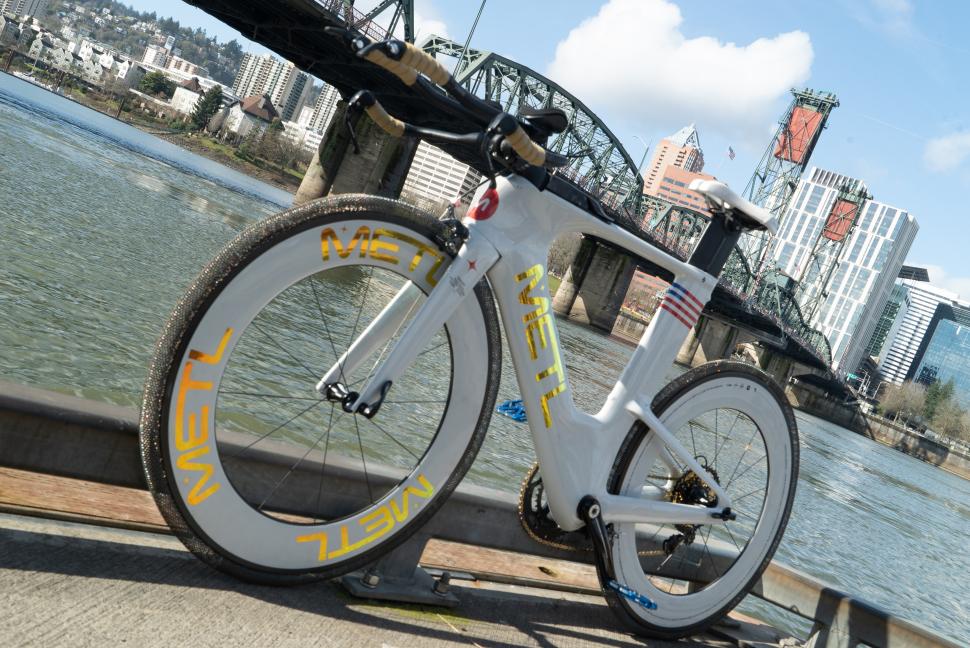- News
- Reviews
- Bikes
- Accessories
- Accessories - misc
- Computer mounts
- Bags
- Bar ends
- Bike bags & cases
- Bottle cages
- Bottles
- Cameras
- Car racks
- Child seats
- Computers
- Glasses
- GPS units
- Helmets
- Lights - front
- Lights - rear
- Lights - sets
- Locks
- Mirrors
- Mudguards
- Racks
- Pumps & CO2 inflators
- Puncture kits
- Reflectives
- Smart watches
- Stands and racks
- Trailers
- Clothing
- Components
- Bar tape & grips
- Bottom brackets
- Brake & gear cables
- Brake & STI levers
- Brake pads & spares
- Brakes
- Cassettes & freewheels
- Chains
- Chainsets & chainrings
- Derailleurs - front
- Derailleurs - rear
- Forks
- Gear levers & shifters
- Groupsets
- Handlebars & extensions
- Headsets
- Hubs
- Inner tubes
- Pedals
- Quick releases & skewers
- Saddles
- Seatposts
- Stems
- Wheels
- Tyres
- Health, fitness and nutrition
- Tools and workshop
- Miscellaneous
- Cross country mountain bikes
- Tubeless valves
- Buyers Guides
- Features
- Forum
- Recommends
- Podcast
TECH NEWS
 SMART Tire Company METL 4
SMART Tire Company METL 4SMART Tire Company unveils new second-generation prototype of ‘space-age’ metal tyres
Last year we reported on the invention of a new airless metal bike tyre, using technology straight from NASA’s labs, which was designed to make punctures a thing of the past. This week the creators behind the METL tyre, the SMART Tire Company, have unveiled a new second-generation model which they claim will be 50% lighter and cheaper.
The emergence of this new prototype comes in the same week that the company made an appearance on the television programme Shark Tank (an American version of Dragons’ Den), where they – unsuccessfully – pitched the product to a panel of would-be investors, including comedian and guest star Kevin Hart.
> Could these NASA-developed 'space-age metal' bike tyres make punctures a thing of the past?
According to the SMART Tire Company (STC), the tyres use the same airless shape memory technology that NASA employed for its Superelastic Tire, utilised on Mars Rover missions to eliminate the possibility of punctures when travelling in the farthest reaches of space (a scenario many of us who have flatted on a remote country lane with no spare tube can sympathise with).
The tyres are made from advanced, lightweight materials known as NiTinol+, which the company claims allows them to be elastic like rubber but as strong as titanium. This means that they will hold perfect shape memory without going flat, while still ensuring a smooth ride. STC says that their tyres can become a permanent part of the bike, without the need to replace tubes or regularly maintain them.
However, this NASA technology doesn’t come cheap, and the company has estimated that one set of their tyres will cost over £2,000. They have therefore spent much of the past year attempting to create a more affordable version of the METL while still maintaining high performance.
The new design unveiled this week reduces the weight of the NiTinol core by over 50%, which STC claims will also lower costs. Through an agreement with NASA’s Glenn Research Centre, the company also hopes to further improve the design efficiency by “25% or more” this year, before finally going to market.
“From the first prototype, these tyres have shown great promise to revolutionise the cycling industry with high performance and low maintenance,” says STC’s co-founder Brian Yennie. “However, our job is not done until they are affordable and can be produced at a large scale.
We also set lofty goals that all of our tyres would be eco-friendly and made in the USA. This new design represents a major step towards achieving all of those goals.”
> Vittoria launches run-flat Air-Liner inserts for road bikes
While the tyres represent the use of space technology for earth-bound purposes, the company’s founders also aim to sell their product to NASA for its upcoming return to the moon. “When the first woman drives on the moon, or when the first human explorers visit Mars, we expect them to be riding on SMART tyres”, says the company’s CEO Earl Cole.
These lofty ambitions and new technology were not enough to secure the backing of the Sharks, however, with the costs involved leading each investor to declare themselves ‘out’ on a potential $500,000 deal.
Despite the knockback on national TV, the SMART Tire Company’s founders will be hoping that their METLs won’t go the same way as some other high-profile attempts at creating airless and puncture-proof tyres, with Bridgestone’s ‘Air Free Concept’ technology failing to materialise despite the firm’s ambition to start selling the tyres in 2019.
After obtaining a PhD, lecturing, and hosting a history podcast at Queen’s University Belfast, Ryan joined road.cc in December 2021 and since then has kept the site’s readers and listeners informed and enthralled (well at least occasionally) on news, the live blog, and the road.cc Podcast. After boarding a wrong bus at the world championships and ruining a good pair of jeans at the cyclocross, he now serves as road.cc’s senior news writer. Before his foray into cycling journalism, he wallowed in the equally pitiless world of academia, where he wrote a book about Victorian politics and droned on about cycling and bikes to classes of bored students (while taking every chance he could get to talk about cycling in print or on the radio). He can be found riding his bike very slowly around the narrow, scenic country lanes of Co. Down.
Latest Comments
- dh700 3 hours 11 min ago
It's going to be a long, long time before the world starts running out of steel-framed bikes of any description. I pick up one or two a year for...
- Zebulebu 5 hours 46 min ago
You can't enter BC races because you don't have a BC license?...
- LookAhead 3 hours 45 min ago
I didn't take him to be calling this particular incident a mere encounter but rather to be using "encounters" to mean "opportunities for violent...
- Rendel Harris 8 hours 36 min ago
Come on guys, appreciate all the entertainment you provide and discussion you provoke but really, two seconds just skimming your articles for...
- chrisonabike 10 hours 12 min ago
Councils don't seem terrible keen ... maybe eburtthebike can give us the insider view in why not?...
- Hirsute 13 hours 30 min ago
Another pathetic sentence for killing a cyclist....
- Surreyrider 13 hours 50 min ago
You sound like the PR for hookless wheels. ...
- HoarseMann 14 hours 48 min ago
...and maybe a third? Don't forget the M49 'ghost' junction: https://www.bristolpost.co.uk/news/bristol-news/work-m49-ghost-junction-...
- ubercurmudgeon 17 hours 14 min ago
What a shit world we've created.


Add new comment
10 comments
I'm out - it'll be dead obvious to the fuzz who's been riding down all those cats, pedestrians, bollards and bridges. Might as well put a number on myself!
About time we had space tyres for our bikes. I've been banging on and on to NASA about building some pump tracks on the moon. 1/6th gravity will make for some awesome bunny hops.
You'll just need to watch out for the Soup Dragon
It would be a divine thing.
That doesn't look much like a soup dragon - have you dropped a clanger?
Quite right - the hidebound cycle industry's clinging to venerable "gravel" and "fat bike" genres which are clearly suboptimal for shredding regolith.
I'm favouring some kind of aerogel material, partly for its low density and thermal insulation properties but mostly because it looks cool. The best thing is that by the time anyone can make a prototype it will be irrelevant as 99% of cyclists will be on Zwift etc. and will be cycling gas giants on a virtual version of these. Coefficient of friction 0.001. Weight 5 grams. Top trumps!
still trying to undersstand what types of rider/bikes these will be aimed at - resiliant for bike sharing applications or high end timetrialists. No mention of availability at different 'pressures' or flex/give...or how they grip when cornering or in different conditions. metalic surface in the wet on tarmac are things we all know dont normally go well together
They don't exactly look aero
Look like they would be in their element cycling on snow, so long as they don't clog up (or do weird Nitinol stuff at low temps). Basically they're like dainty snow chains, without the tyre. And like snow chains, I guess they'll also last a whole lot longer running on snow than on tarmac.
I'd put one on the rear of my bike if they made sparks when you braked too hard and locked the wheel.